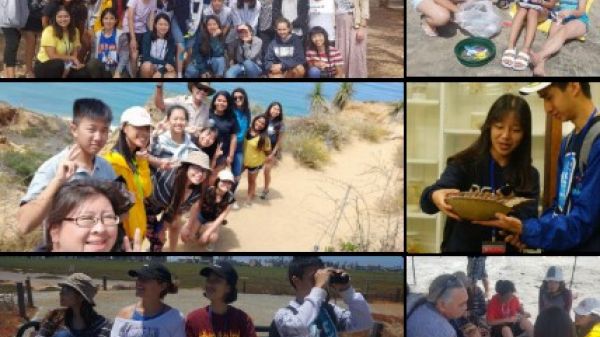Empowering Young People to Adapt to a Changing World: The International Student Conservation Leadership Summit

This preliminary case study through the Global Environmental Education Partnership (GEEP) explores the first ever International Student Conservation Leadership Forum, a collaboration between the National Wildlife Federation and the Taiwan Ministry of Education. This program just completed it's second year in existence; although relatively new, there are several lessons learned from their first year, shared below.
Overview: Using the internationally-recognized Eco-Schools and GLOBE (Global Learning and Observations to Benefit the Environment) frameworks, federal and non-government organization (NGO) partners from the U.S. and Taiwan conducted a week-long immersive learning exchange program called Student Conservation Leadership Summit (SCLS) with 28 high school students from the U.S. and Taiwan. The theme Watersheds, Oceans, and Wetlands- Water Connects Us All provided student teams with real-world and relevant opportunities to investigate environmental issues facing our oceans. Students shared how the issues impacted their community, where they saw evidence of the impact, and questions they wanted to research.
SCLS is a pilot program, launched in August 2018, with partners from the Department of Information and Technology at the Ministry of Education in Taiwan, the U.S. Environmental Protection Agency, the National Wildlife Federation, and National Kaohsiung Normal University. Preliminary student outcomes of this pilot program include: increased cultural awareness; strengthened collaboration between U.S. and Taiwan partners and students; and skills building around the scientific method, data collection, and communication of technical information.
Background: The SCLS employed several research-based approaches to design their summer learning exchange program, including Eco-Schools, GLOBE, and the North American Association for Environmental Education’s’s Guidelines for Excellence:
The Foundation for Environmental Education’s Eco-Schools program is the largest sustainable schools program in the world and is operated in 55,000 schools in 68 countries. The program follows a seven step process that empowers young people to lead change in their schools and communities through action-based learning. The National Wildlife Federation is the exclusive host of Eco-Schools in the United States which engages more than 5,300 schools annually.
Sponsored by NASA, GLOBE provides grade level-appropriate, interdisciplinary activities and investigations about the atmosphere, biosphere, hydrosphere, and soil/pedosphere, which have been developed by the scientific community and validated by teachers. GLOBE connects students, teachers, scientists, and citizens from different parts of the world to conduct real, hands-on science and field experiences about their local environment and to put this in a global perspective.
NAAEE’s Guidelines for Excellence provides a framework for effective environmental education for K-12 students, and includes principles such as systems thinking, real world experience, diversity/inclusion, and a focus on sustainability.
Through this SCLS pilot, National Wildlife Federation staff developed content, curriculum, and field experiences consistent with these three programs to provide an immersive, cultural exchange for students. Both National Wildlife Federation and National Kaohsiung Normal University staff were responsible for recruiting, selecting, and preparing 28 students, including two indigenous students from each country, to participate in SCLS.
Approach: Environmentally literate community members are not only capable of taking individual action, but are able to make well-informed decisions collectively. Increasingly, individuals are asked to make choices on complex issues that affect their own lives and the lives of their families, their communities, and the world beyond their shores.
SCLS provided opportunities for students to build their capacity for independent thinking and effective, responsible action. Through GLOBE hydrology investigations and utilizing the Eco-Schools seven step action framework, students developed skills in areas of:
Systems thinking
Critical thinking
Cultural relevance
Cultural competency
Information gathering and analysis
Collaboration
Communication
Through a one week immersive experience at the University of California San Diego, students worked in heterogeneous four-person teams to investigate a local environmental issue related to pollution, habitat destruction, or acidification and warming.Students collected data about water temperature, salinity, conductivity, pH, and transparency. Subject matter experts from the US Environmental Protection Agency Region 9, Kumeyaay Community College, University of California San Diego, the Birch Aquarium, and Tijuana National Estuarine Research Reserve presented a well-rounded assessment of the current environmental state of San Diego area watersheds and oceans.
As the week progressed, students continued to refine their research as they learned new information and collected new data. Simultaneously, as students collaborated, they also deepened their knowledge of and respect for indigenous cultures and differing points of view. At the culmination of the week, student groups presented their findings and recommended action projects on the final night of SCLS. At the conclusion of the week, students continued to receive ongoing, continuous support as they implement their action projects within their schools and communities.
Outcomes/ Results: Twenty-eight students worked in groups of four to implement seven community action projects in the U.S. and Taiwan. Using a systems thinking and place-based instructional methodology, students had opportunities to scaffold their learning, both strengthening and deepening their understanding of water systems and watersheds. They used data to identify environmental threats and to propose effective solutions. Other outcomes, collected through a reflective writing exercise from instructors and participating students, included:
- Increased cultural awareness: not just social interactions with new people, but also cultural awareness between two countries and between indigenous and non-indigenous students
- Strengthened collaboration between U.S. and Taiwan partners and students
- Student skill development: conducting scientific investigations independently and in groups, analyzing data and evaluating research to ensure its reliability, drawing conclusions from sets of data, and effectively communicating science, results, and solutions
Lessons learned:
Sharing indigenous knowledge should be a high priority. Solving large-scale environmental and social issues requires active listening, learning, and co-creation of solutions. Traditional and indigenous knowledge is often not incorporated into educational activities, resulting in a huge expertise gap. This program provided a unique opportunity for students from indigenous communities to share their perspectives in a supportive, collaborative environment.
Evidence-based pedagogy provides an optimal framework for learning. Through hands-on, experiential learning, students are empowered to construct their own learning. Students learn how to think, not what to think. Critical thinking skills are necessary to solve the environmental issues of tomorrow. This is very much in line with NAAEE’s K-12 Guidelines for Excellence, which suggests that self-directed, experiential learning is a key component of quality environmental education.
Play is an incredibly powerful learning tool. Students spent half of each day in the classroom, and the other half of the day in the field. The days were long and hot. After dinner, we led the students in structured activities such as a sand volleyball game, basketball, “sing off” competition, crafts, and trivia. We learned about the “power of play” when several of the American boys taught the Taiwanese students how to body surf in the Pacific Ocean, when a group of American girls taught the Taiwanese students how to make friendship bracelets, and when the indigenous students from both countries taught everyone how to participate in native dances. The students took initiative to connect with each other on a very personal level, and it was done without adult facilitation. The environment and play became equalizers; culture, gender, language, and age didn’t matter.
Collaboration is necessary in addressing 21st century environmental issues. Environmental issues cross geographic, social, economic, and cultural lines. All activities during this week-long program required students from a diversity of backgrounds to work together. Although this particular experience requires significant funding to recreate, this program provided a supportive environment for students to practice collaboration skills that can be applied to real-world experiences. Global exchanges can promote civic engagement, conservation stewardship, and sound science education.
Connect on eePRO!
Kim Martinez, MEd Educational Administration
Senior Director K-16 Education Programs
National Operator of Eco-Schools Program in United States
National Wildlife Federation
Yi-Hsuan Tim Hsu
Professor & Director
Environmental Education and Ecological Conservation Extension Center, Aletheia University, Tainan, Taiwan
Executive Director, Global Environmental Enhancement, Inc.
